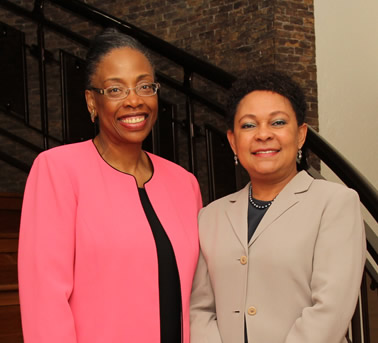This story originally appeared in Lawyer, Fall 2015.
 Judge Helen Whitener '98 laughs easily and speaks of her recent career success with a calm sense of bemused humility. She's not the sort of person you imagine being slapped with handcuffs and whisked off to jail as an international criminal.
Judge Helen Whitener '98 laughs easily and speaks of her recent career success with a calm sense of bemused humility. She's not the sort of person you imagine being slapped with handcuffs and whisked off to jail as an international criminal.
Yet that was the risk she faced when she returned in June to her home country of Trinidad and Tobago. Laws there outlaw homosexuality, and Whitener is openly gay. In fact, that was the reason for her visit. The U.S. Embassy invited her to celebrate National Caribbean-American Heritage and Lesbian, Gay, Bisexual, and Transgender Pride (LGBT) months.
"It was really important for me to put a face on the issue back home. We have privileges here that I knew were not available there," she said. "But I had to pass it by my wife first. There was a good possibility I would be arrested."
Thankfully, the only people who whisked her anywhere were reporters and representatives from the many human rights and student groups she addressed.
Judge Whitener was appointed by Gov. Jay Inslee to the bench of Pierce County Superior Court in January, the youngest woman of color to serve in that position. (She's 50.) Her wife, Lynn Rainey, is a 2007 graduate of the law school.
Since then she's realized that she now has an amplified voice she can use to advocate for the causes she believes in - access to justice, disability rights, gender equality, and LGBT awareness. It's an honor she never would have imagined as a 16-year-old girl immigrating to New York City all by herself so long ago.
Judge Whitener suffers from a back condition that required sophisticated medical care at the time, necessitating her travel to the United States. After treatment, she stayed to study international marketing and trade at Bernard Baruch College.
"I always imagined I'd be a business woman. My intent was to do something that tied the Caribbean with the United States," she said. "So I went to Anchorage because that was the import-export hub for the Pacific Rim. Imagine this island girl in that cold place!"
After three years she moved back to the Lower 48, working at an accounting firm in Bellevue where her sharp analytical skills were noticed right away by a colleague who encouraged her to try law school. She found her home in Seattle U's Academic Resource Center.
"I didn't even research any other law schools," she said. "I was the perfect candidate for the ARC program because I had potential but didn't understand the system. I was brought up in the British education system, so things were different."
Professors Paula Lustbader and David Boerner, who led the ARC program for 30 years, provided crucial support for her and became lifelong friends. When Professor Boerner's offer to hire her as a teaching assistant conflicted with another job offer from the Washington Attorney General, he called the AG's office personally to iron out the schedule. She kept both jobs, plus a third job at a bank.
Her legal career has included stints in prosecution, private and public defense, and administrative law. Retired District Court Judge David Kenworthy wrote in Pierce County Lawyer magazine that when they worked together on an assignment many years ago, he strongly encouraged her to seek a judgeship.
"At times I would almost describe her as being regal or queenly," he wrote. "She carried herself so nicely, no matter what the circumstances, and never let herself show any sign of being rattled or off-guard."
Perhaps it's that quality that made her such an effective ambassador in Trinidad. As she met with countless audiences and conducted interview after interview, she kept in mind the words of her country's national anthem: "Here every creed and race / Find an equal place."
"That should include everyone," she said. "Human rights are not just defined by the obvious things, like gender and race. Everywhere I spoke I tried to move the discussion from LGBT rights to human rights because the message is the same across the board." Activists in Trinidad and Tobago have already made significant progress in promoting anti-discrimination policies, and she hopes it's just a matter of time before the outdated laws are off the books for good.
She said the support she received in law school has been an ongoing source of strength as she undertakes new challenges in her career.
"I always believed in myself but that supportive environment really bolstered my confidence," she said. "When something new comes up, I don't question my abilities, I just do it. I just figure out how to do it."
